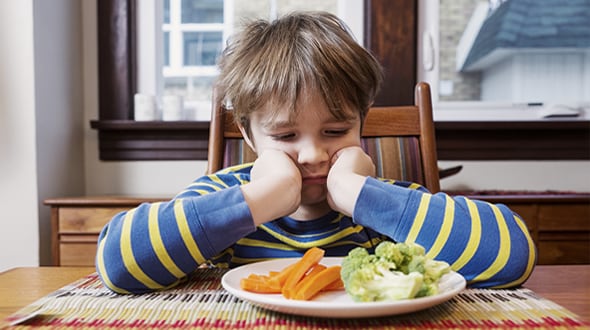Plating up for picky eaters: Part 1
Why some kids are fussy eaters and what mistakes to avoid.
Health Agenda magazine
July 2016
When you’re the parent of a fussy eater every meal can feel like a battle. And with mealtimes rolling around three times a day, that’s a lot of time to spend feeling stressed out, frustrated, and powerless.
Of course, you want to do everything you can to provide a healthy meal for your child to give them the best start in life, but it's hard when they reject the food you lovingly prepare or won’t even try it. Even worse is when they turn around one day and decide the meal they once happily devoured is now poison from the kitchen.
It’s enough to make the most well-intentioned parent resort to some questionable methods of persuasion that may make the problem worse, or offer less nutritious options purely because they know it will get eaten. If you’re in this position, don't despair. It’s possible to expand the taste buds of even the pickiest eater and retain your sanity in the process.

Why are kids fussy eaters?
According to David Katz, nutritionist and the founding director of Yale University's Prevention Research Centre, rejecting food has been ingrained in children over years of evolution.
“Neophobia – fear of the new – is built into our DNA,” he says. “In our ancestors’ time, any new food could be toxic so omnivores are natively reticent about trying anything new. This is most acute, and least controlled, in early childhood,” he says.
So why are some children fussier than others? Bee Wilson, award-winning British food journalist and author of First Bite: How We Learn to Eat, says this is partly due to genetics.
At the more extreme end, she says, “More than 70 per cent of children on the autistic spectrum have some kind of difficulty with feeding. There are kids so scared of new foods they need to be fed by tube to survive. It’s also true that flavour is different to different people. You may hate coriander because your genes make you experience the taste as soap,” she adds.
Big sugar is part of the problem
According to Wilson, paediatricians are seeing more selective eaters than ever. “The problem is partly that the food industry pushes an increasing array of kids’ food high in sugar, fat and salt, which teaches children this is how food should taste: sugary cereals, supposedly healthy fruit bars, and over-sweetened yoghurts,” she explains.
“The more of these foods children eat, particularly at a young age, the more limited their palate becomes. It can then be difficult for a parent to persuade a child to enjoy the more subtle flavours of real home-cooked food.”
However, no matter how extreme an individual’s food preferences, everyone is capable of change. “The foods we love are almost all a question of exposure. We all start life drinking milk; all of our other tastes are learned," states Wilson.
“Mothers who drink a lot of carrot juice during the last trimester of pregnancy give birth to babies who prefer carrot flavoured cereal, while babies fed on hydrolysate formula milk – designed for infants who can’t tolerate cow’s milk – come to prefer sour tastes.”
But as Wilson concedes, “The hardest part is exposing a reluctant child to new flavours without it becoming source of contention.”
Counterproductive coercion
Wilson – who admits she made “every mistake in the book” with her own children, particularly when it came to her third child who was born with cleft palate – says trying to coerce kids to eat will often only increase their reluctance.
Wilson advocates that, “The old-fashioned technique of sitting with a child until he or she finishes what’s on the plate is unwise as well as cruel. All it does is teach the child to dislike that particular food even more.
What surprised me when I started researching the subject was that even mild forms of pressure can affect a child’s eating. When researchers sat with a child and told them, ‘Finish your soup’, it made them feel negatively about the meal and they also ate less,” she adds.
Another counterproductive technique many parents use is to offer a sweet food as a reward. “The drawback of saying, ‘Eat your broccoli and you can have cake’, is that it makes you like the cake more and the broccoli less.
Psychologists call this the over justification effect,” says Wilson, who suggests using a sticker system as a more effective way of rewarding kids. “Desserts should be offered just like any other food: not as something uniquely wonderful, nor as something naughty, just as food.”
Wilson warns that the use of sweet treats to reward children can leave a lasting legacy. “As adults we still reward ourselves with treats or calm an angry mood with ice-cream, even though our parents are no longer there to watch.”
Learn more
For practical advice on encouraging kids to embrace a variety of foods read Plating up for picky eaters: Part 2.